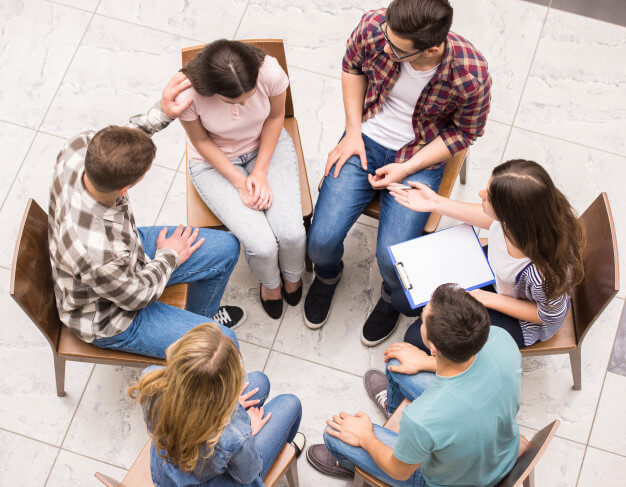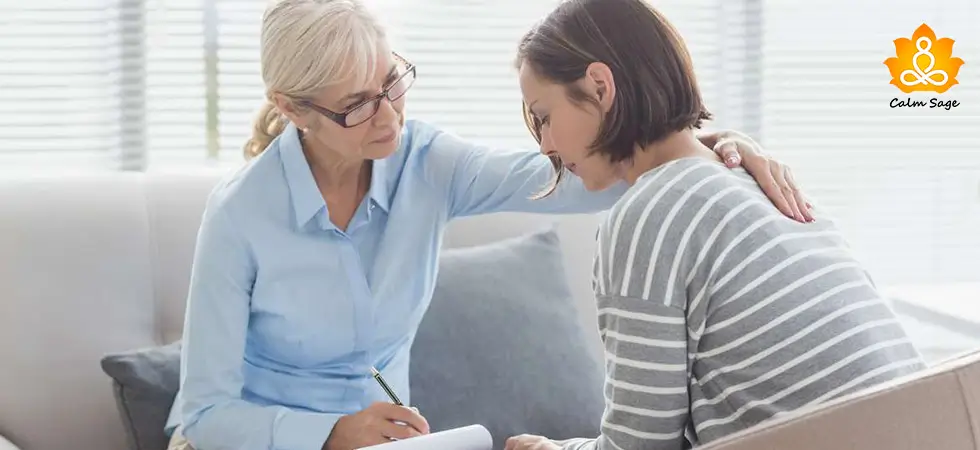A Complete Guide to Group Therapy

Are you looking forward to taking therapy? But, can’t decide whether to go for an individual or group therapy?
Or
Have doubts about group counselling?
Well, not anymore! You don’t have to think much about before opting for this therapy because we are providing you with a complete guide here.
According to Judye Hess, Ph.D., a clinical psychologist for many people “group therapy can be more powerful and mutative than individual therapy.”
Goals of Group Therapy
Just like any other therapy has its own goals. By and large, goals of group counselling are divided into categories:
1. Process Goals
Goals related to the process of understanding personal concerns related to the therapy and other members of the group.
2. Outcome Goals
The final output that an individual looks forward to achieving by participating in group sessions. Behavioral and thought changes are to be expected from the therapy.
Apart from this, there are few more goals of group therapy:
- Initiating a sense of belongingness and creating universal reliability
- Sharing common experiences by developing an understanding
- Identifying maladaptive behaviors to help the individual
- Providing positive feedback that aids in dealing with emotional difficulties
- Offering a supportive environment to an individual with peers having similar life experiences
- Reducing the feeling of loneliness by bringing together individuals who share a similar set of problems and emotional experiences
Principles of Group Counselling
Irvin D. Yalom wrote a book on the Theory and Practice of Group Psychotherapy wherein he proposed 11 principles of Group Therapy. These principles are more of therapeutic factors that he identified as influencing change and the healing process in this therapy.
- Instillation of Hope: Seeing others going through the problems as you are and watching them grow and recover from it instills a ray of hope. Plus, it showers optimism.
- Universality: You are not alone in this phrase comes to reality while working in this therapy. As you are working with others who by and large share the same set of problems that you are.
- Imparting Information: Group members empower and educate each other by sharing their understanding and knowledge.
- Altruism: By helping other members of the group in one way or the other, one gains a sense of confidence.
- Corrective Recapitulation: Childhood behaviors are revisited that have resulted in present behaviors. These are then worked on within the safety of the group family.
- Socializing Techniques: The fear subsidies and social development promotes through group therapy.
- Imitative Behavior: Individuals learn through the behavior of other group members and the therapist various coping strategies and healthy behaviors.
- Interpersonal Learning: Group therapies help in developing supportive interpersonal relationships. It helps in developing a greater understanding of themselves.
- Group Cohesiveness: Cohesiveness is known as the ‘we-ness’ of a group, giving its members a sense of belonging, value, security, and acceptance.
- Catharsis: Sharing of experiences and feelings with other group members relieves stress, pain, or guilt and starts healing.
- Existential Factors: Members take responsibility for their choices, actions, lives by living existentially.
Situations Where Group Therapy Works the BEST
No one list comprises situations where group Counselling works the best. However, there are a few common issues that are addressed through group counseling:
- Low self-esteem
- Post-traumatic stress disorder
- Postpartum depression
- Grief and loss
- Disordered eating
- Anger and stress management
- Addiction and dependency
- Parenting
- Relationship problems
Benefits of Group Therapy
The key advantages of group therapy as suggested by Miller and Hess
1. It gives a subtle message of you are not alone
Our mental health conditions get intensified with our perception of being alone experiencing it. This perception changes with therapy effectively. Miller says this therapy reduces isolation and alienation. It increases the sense that “we’re all in this together,” and normalizes suffering.
2. It promotes healthy giving and receiving
Instead of just therapists giving inputs, the members of the group come together to provide support, feedback, and connection. This all comes from personal experiences, thus, making it more realistic.
3. It helps to relate with others in a healthy manner
Miller proposes that the group provides an opportunity for its members to see how they can relate with others in a moment. Plus, how they can relate with themselves healthily.
4. It aids in finding your voice
Group setting allows one to become aware of his feelings on one hand and expressing them openly on the other. This way one can learn to understand his emotions and effectively voice them to others.
5. It provides a safety
Group sessions provide a safe and secure environment not only to share your problems but also to practice certain behaviors and actions.
Other group therapy benefits are:
- It is cost-effective
- It leads to interpersonal learning
Limitations of Group Therapy
Along with the long list of benefits that group counselling has to offer, few limitations follow. There are chances of being triggered by another person’s story or experience. Also, not everyone is convenient for sharing their concerns openly. A major concern is ‘confidentiality’ although all guidelines ensure it is followed. The best suggestion here is to club group therapy with individual counseling sessions.
Joining Group Counselling:
Now before you opt for group therapy here are some key questions for you to check for:
Is the group open or closed?
Open groups welcome new members to join in at any time. Closed groups on the other end in which all members start together for a session at the same time.
The number of members in the group?
Discuss with your mental health care professional whether a small group or a large group will work effectively for you. Both of them come with their own list of pros and cons. While small groups offer room to focus on individual needs, larger groups help greater diversity and a wider range of perspectives.
Are group members alike?
This is yet another important check as joining a group of like-minded individuals with a shared perspective can encourage you to relate to others in healthier ways, ultimately helping you to grow personally and cope effectively with the challenges in life.
How much to share?
Group therapy works best when there is open and honest communication between its members. Generally, it is found that group members start as complete strangers but end the session by creating a small trusted circle.
With all this answered it is important to make one point clear here that whether you are opting for group counseling or individual the most beneficial is the one that meets your specific needs.
More power to you…
Other Interesting Topics-
10 Inspirational Movies To Fight Depression
Check your mental zone: Fear Zone, Learning Zone, Growth Zone.
6 Stress management techniques to vanish your stress at a snap.























